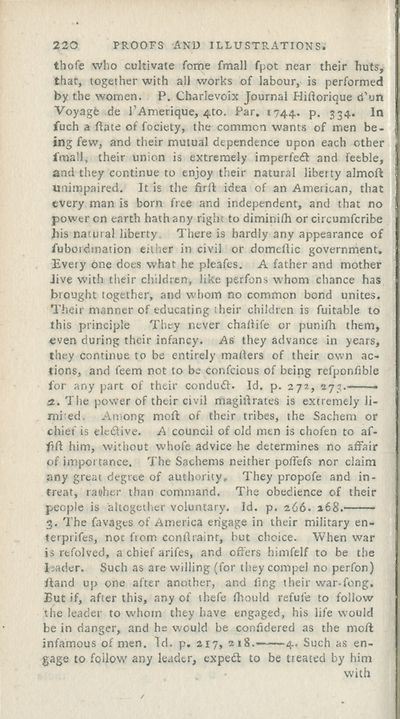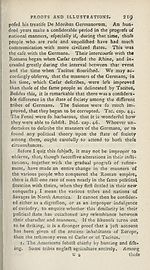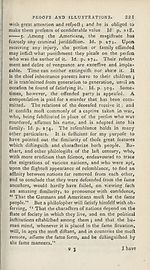Download files
Complete book:
Individual page:
Thumbnail gallery: Grid view | List view

220
PROOFS AND ILLUSTRATIONS
thofe who cultivate Come fmall fpot near their huts,
that, together with all works of labour, is performed
by the women. P. Charlevoix Journal Hiftorique d’un
Voyage de I’Amerique, 4.10. Par. 1744. P- 33+- In
fuch a ftate of fociety, the common wants of men be¬
ing few, and their mutual dependence upon each other
fniall, their union is extremely imperfedt and feeble,
and they continue to enjoy their natural liberty almoft
unimpaired. It is the firil idea of an American, that
every man is born free and independent, and that no
power on earth hath any right to diminilh or circumfcribe
his natural Hberty. There is hardly any appearance of
fuboidmation either in civil or domcllic government.
Every one does what he pleafes. A father and mother
Jive with their children, like perfons whom chance has
brought together, and whom no common bond unites.
Their manner of educating their children is fuitable to
this principle They never challife or punifh them,
even during their infancy. As they advance in years,
they continue to be entirely mailers of their own ac¬
tions, and feem not to be confcious of being refponfrble
lor any part of their conduit. Id. p. 271, 277.——
a. The power of their civil magirtrates is extremely li¬
mited. Among molt of their tribes, the Sachem or
chief is elective. A council of old men is chofen to af-
frit him, without whole advice he determines no affair
of importance. The Sachems neither poffefs nor claim
any great degree of authority. They propofe and in¬
treat, rayher than command. The obedience of their
people is altogether voluntary. Id. p. 266. 168.
3. The favages of America engage in their military en-
terprifes, not from contlraint, but choice. When war
is refolved, a chief arifes, and offers himfelf to be the
liader. Such as are willing (for they compel no perfon)
iland up one after another, and ling their war-fong.
But if, after this, any of thefe fllould refute to follow
the leader to whom they have engaged, his life would
be in danger, and he would be confidercd as the moil
infamous of men. Id. p. 217, 218. 4. Such as en¬
gage to follow any leader, expedt to be tteated by him
with
PROOFS AND ILLUSTRATIONS
thofe who cultivate Come fmall fpot near their huts,
that, together with all works of labour, is performed
by the women. P. Charlevoix Journal Hiftorique d’un
Voyage de I’Amerique, 4.10. Par. 1744. P- 33+- In
fuch a ftate of fociety, the common wants of men be¬
ing few, and their mutual dependence upon each other
fniall, their union is extremely imperfedt and feeble,
and they continue to enjoy their natural liberty almoft
unimpaired. It is the firil idea of an American, that
every man is born free and independent, and that no
power on earth hath any right to diminilh or circumfcribe
his natural Hberty. There is hardly any appearance of
fuboidmation either in civil or domcllic government.
Every one does what he pleafes. A father and mother
Jive with their children, like perfons whom chance has
brought together, and whom no common bond unites.
Their manner of educating their children is fuitable to
this principle They never challife or punifh them,
even during their infancy. As they advance in years,
they continue to be entirely mailers of their own ac¬
tions, and feem not to be confcious of being refponfrble
lor any part of their conduit. Id. p. 271, 277.——
a. The power of their civil magirtrates is extremely li¬
mited. Among molt of their tribes, the Sachem or
chief is elective. A council of old men is chofen to af-
frit him, without whole advice he determines no affair
of importance. The Sachems neither poffefs nor claim
any great degree of authority. They propofe and in¬
treat, rayher than command. The obedience of their
people is altogether voluntary. Id. p. 266. 168.
3. The favages of America engage in their military en-
terprifes, not from contlraint, but choice. When war
is refolved, a chief arifes, and offers himfelf to be the
liader. Such as are willing (for they compel no perfon)
iland up one after another, and ling their war-fong.
But if, after this, any of thefe fllould refute to follow
the leader to whom they have engaged, his life would
be in danger, and he would be confidercd as the moil
infamous of men. Id. p. 217, 218. 4. Such as en¬
gage to follow any leader, expedt to be tteated by him
with
Set display mode to:
![]() Universal Viewer |
Universal Viewer | ![]() Mirador |
Large image | Transcription
Mirador |
Large image | Transcription
| Antiquarian books of Scotland > Kings & rulers > History of the reign of the Emperor Charles V. > Volume 1 > (238) |
|---|
| Permanent URL | https://digital.nls.uk/109185187 |
|---|
| Description | By William Robertson. London : Cadell and Davies, 1798. |
|---|---|
| Shelfmark | ABS.1.76.13 |
| Additional NLS resources: | |
| Description | Thousands of printed books from the Antiquarian Books of Scotland collection which dates from 1641 to the 1980s. The collection consists of 14,800 books which were published in Scotland or have a Scottish connection, e.g. through the author, printer or owner. Subjects covered include sport, education, diseases, adventure, occupations, Jacobites, politics and religion. Among the 29 languages represented are English, Gaelic, Italian, French, Russian and Swedish. |
|---|

